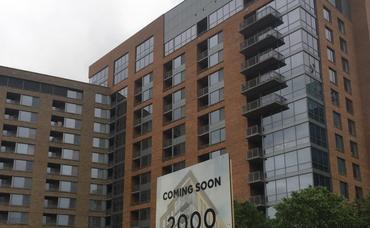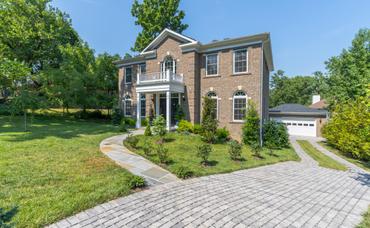One of the most common questions that home owners have is: “What is my home worth?”
It’s a reasonable question to have — after all, if you are interested in learning how to sell your home then it makes sense to want to know what you might be able to get for it on the open market. There are a lot of tools on the internet that you can use to get an estimate of what your house’s value is. Some of these like Zillow’s popular Zestimate tool uses an Automated Valuation Model (AVM) which uses a series of mathematical models based on comparables of other houses to determine what your home is worth. However, it is common knowledge in the real estate world that tools like the Zestimate are inaccurate and can be up to 30% off the true value of your home since the AVM leaves out other important factors when estimating the value of your home. This is why at the Keri Shull Team we created our own more robust Home Valuation Tool, which is more accurate than others due to complex market algorithms and widely-sourced data which our tool utilizes.
However, none of these tools are going to be 100% accurate in all situations. This is because the housing market can shift very quickly, especially in the hot neighborhoods of Washington DC and the surrounding areas. So, if you are planning to sell your home, you can’t necessarily rely on a home valuation tool. This is especially true if you need to have an accurate estimation of your property’s worth in order to complete other real estate moves. The most common instance of this is if you are buying and selling a home at the same time — this is what we call being a move-up buyer.
If you don’t want to fall into the rookie mistakes that other move-up buyers make, then you need to have an up-to-date understanding of your home’s value. At the Keri Shull Team, we have mastered the art of valuing and pricing houses — and here are some of the most important factors that we use to identify what your home is worth.
1. Comparable Sold Properties
Before you even meet with your real estate agent, they will have done a ton of behind-the-scenes work. One thing that they will do is pull a list of similar properties to compare with yours. This will give you and your agent an idea of how much your home might sell for on the open market.
It’s important to keep in mind that this is a complex comparison. You can’t just go on Zillow and find a home with the same square footage and assume that you can sell your property for the same amount. Good real estate agents perform in-depth analyses on your house and comparable properties to help you learn what your home value is.
Comparable property analysis is a great way to get a sense of how healthy your local market is. It’s also a good place to get a general answer to the question, “what is my home worth?” However, to understand the specific value of your property, you and your agent will need to explore some more details about your home.
2. Changing Neighborhood Features
In hot real estate markets (like DC and the surrounding area), neighborhoods change quickly. Within a matter of just a few years, home values in any neighborhood might grow exponentially. Other areas could see more stable sales prices — it depends on how the individual neighborhood is changing!
So even though you may have researched comparable sold properties in your neighborhood, there’s a chance that they don’t represent what your home is really worth. If your property is a rapidly-changing neighborhood, you need to make sure that you are taking those changes into account when setting the price of your home.
For a local example, consider the newly-named National Landing neighborhood in the DMV. This region, which contains land in both Arlington VA and Alexandria VA, gained fame as the site of Amazon.com’s HQ2 project. With this announcement, a lot of people began to speculate about rising real estate costs near Amazon’s new headquarters.
The case of HQ2 and National Landing is an extreme example, but it’s important to consider any and all neighborhood features when trying to figure out what your home is worth. So what’s the best way to know how these affect your house’s value? Make sure you are working with a team of local experts who constantly study changing neighborhood trends in the area!
3. Market Health
A lot of people choose to invest in real estate because it is — on the whole — quite stable. Unlike volatile stocks, the housing market tends to not change so rapidly. However, you should still make sure to account for the health of the real estate market when you are finding out what your home is worth.
The housing market doesn’t always move in conjunction with other economic indicators. For instance, it’s not uncommon for real estate sales numbers to stay high even when the stock market falls — in fact, that’s what happened at the beginning of 2020 with the COVID-19 novel Coronavirus scare.
The overall health of the market (and whether your local market is dominated by buyers or sellers) can have a huge impact on what your home is worth — so make sure to stay informed!
4. Upgrades and Renovations
How you have personalized your home is important. Your renovations can greatly increase what your property is worth, depending on how you have updated the home.
Before you just start tearing down walls, however, make sure you speak with your real estate agent about how to get the most bang for your buck. Certain home upgrades can net you a big return on the market, but other renovation projects do not pay off when it’s time to sell.
When you are walking your agent through the home to get an assessment of what the house’s value is, tell them about any renovations that you have made. This will make their calculations more accurate— because your upgrades are not always included in the information they have!
If you are trying to raise the selling point of your home, ask your agent about small renovations or cosmetic updates to make before going on the market. There’s no guarantee that they will want you to renovate something, but it is possible.
5. When you are selling
There are more homes sold in spring and summer than in fall and winter, in general. This is, in part, because there are more buyers looking for homes during the warm months — and therefore, more people listing their homes during that time. However, it’s good to keep in mind that a high-quality real estate team will continue to do plenty of transactions during the fall and winter.
Depending on your personal needs and various other intangibles, your agent will help you create a customized plan that includes when you will be selling the home. Some home owners prefer to sell in summer when there are more buyers who might start a bidding war — but others might want to sell in the winter when there are fewer homes for sale and less competition.
6. How long your home has been on the market
Good real estate agents are clever negotiators. They will use everything in their arsenal to get the buyer that they represent the lowest possible price for your home.
If your home has been sitting on the market for a while, or if you have tried taking it off the market and putting it back on, this can be a big red flag for shrewd real estate agents to pounce. This is why it’s so important to accurately price your home right off the bat. It’s also why For Sale By Owner (FSBO) deals are often disastrous for home owners — you are basically advertising to home buyers that you are negotiating at a disadvantage.
Luckily, there’s a way to ‘test’ what your home is worth on the market without damaging your position. If you work with a real estate team that knows how to sell your house off-market, you can try this tactic. You and your agent can list the property off-market, at a higher price — and if it doesn’t garner enough interest, just set it live at the lower price!
There’s a catch, however. Due to special regulations from the Multiple Listing Service, this strategy only works if your agent can connect you with home buyers without actively marketing the home. Therefore, you need to work with a team that has a large network of motivated home buyers that they can show your home to!
7. Marketability
One of the most important parts of selling a home is properly marketing it. If your home has special selling points that might attract the proper buyers, it could be worth more on the market. Unfortunately, there is no singular formula that determines marketability. To understand your home’s marketability, you will need to speak with your agent about how to best showcase the unique features that could increase your home’s value.
It is important to note that this marketability also depends on the real estate agent with whom you work. Most solo agents — and even many teams — will simply put your home in the Multiple Listing Service and host an open house. You deserve better than this! That’s why at the Keri Shul Team, we have a comprehensive marketing plan that includes social media and digital marketing, video content, and traditional real estate marketing!
8. Buyer Interest
Ultimately, your home’s value is only as high as someone will pay for it. That’s why it’s so important to work with a real estate team that can directly connect you with a buyer. The Keri Shull Team has a network of over 30,000 motivated buyers who are actively looking for a home — and we will find the right one for your home, so you can get the full amount of what your house is worth!
No matter what your home is worth, you need to work with the right people during the home selling process. Collaborating with the best real estate team will ensure that you can sell your home in your time frame, for the most possible money, and with absolutely minimal stress.
It’s also important to make sure that you have accurate expectations for what your home might be worth. The best way to do this is to speak with a real estate agent that is an expert in your market and home values. We train all of our seller success agents to assess what your home is worth and create a pricing strategy to match your needs.
Whether you are living in Arlington VA, in Washington DC, or any other neighborhood in the DMV, we have the local expertise that you need!
If you are interested in learning more about our unique pricing strategy — and how it can help you sell your home faster and for more money — then we want to meet with you. Just click here to schedule a free, no-hassle Home Value Consultation with one of our local experts!







